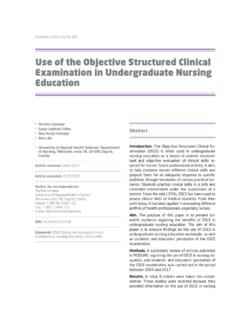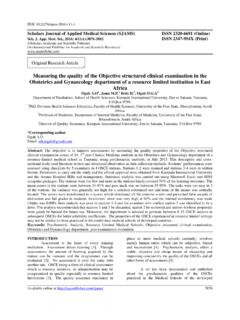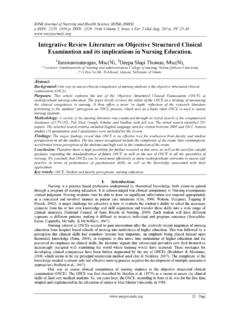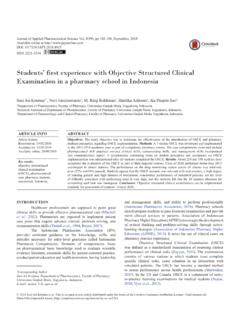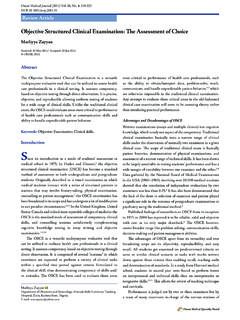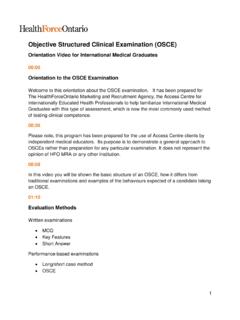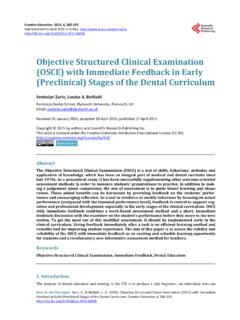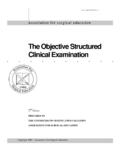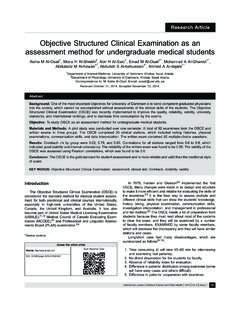Transcription of Title: Author Context and setting: Why the idea was necessary
1 Title: The introduction of Objective structured clinical /Practical examination (OSCE/OSPE) in the Undergraduate Bachelor of Pharmacy Student Assessment in Makerere University Author : Adome, , , Context and setting: Examinations influence learning strategies of students. However if an examination is to achieve this it has to employ instruments that should yield valid, accurate data that are consistent and therefore reliable in reproduction. The instrument should also be feasible within the bounds of time, training, and equipment costs and applicable to the specific circumstances being measured.
2 At Makerere faculty of Medicine there is a heavy reliance on written and oral examinations even in most clinical settings, thus testing mostly the knowledge domain. In addition to this, evidence exists that suggest that many written examination questions are designed in hurray lending itself to the product of unmotivated questions that are neither objective nor easy to mark. Why the idea was necessary : Realizing that skills domain is difficult to test with either written or oral examination format we figured that in order to provide useful information on the student's abilities as compared with the competencies being measured, and in order to be consistent with curriculum goals and objectives , we had to adopt other examination formats.
3 Objective structured clinical /Practical examination (OSCE/OSPE) employing standardized patients (SP) can offer the best tool for assessing skills even in the basic sciences. Standardized patients are trained persons who simulate a medical condition in a standardized way in order to evaluate the clinical skills of trainees. During each station, each student performs a different task and is evaluated. What was done: The introduction of OSCE/PE was approached; starting with the meeting with members of the department to discuss the perception of the present mode of assessment.
4 Thereafter we mounted a 3-day workshop on student assessment with faculty. Using predetermined competencies being evaluated, and the skills to be performed during the SP encounter, instruments were designed for simulated patient instructions that incorporated the specific competencies being evaluated combining knowledge, history taking and communication skills; candidate instructions and scoring checklist for each station. This activity was made in parallel with the training of the students on the process of OSCE assessment.
5 Later OSCE was delivered to a class of 25 third year pharmacy students during the end of semester examinations in June. A twelve-point questionnaire on a 1-10 Likert scale was delivered to the candidates immediately after the examination to evaluate their perceptions about OSCE assessment. Evaluation of the results and impact: On the questionnaire we chose the following three most critical statements to bring out the candidate perceptions: 1, I prefer OSCE form of assessment to the ward-based assessment with \real patients.
6 2, I prefer viva voce to OSCE type of assessment in clinical pharmacy and 3, OSCE is very useful and relevant to my study and the type of work I will be doing after graduation. On the first statement, over 65 % of the candidates indicated that they strongly prefer OSCE to ward-based assessment. On the second question a walloping 80% of the candidates disagreed. The third statement evaluated the candidates perception on the relevance of OSCE in driving learning and its appropriateness for future work. Over 70% indicated that the mode of assessment was very appropriate and that it met their expectation for future work as pharmacists.
7 These results show that OSCE has a very imminent future in our examinations format.
